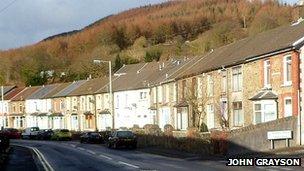Valleys, north and west Wales economic figures 'misleading', claims government
- Published

GDP in the south Wales valleys was 68.4 % of the European average in 2009
The Welsh government says figures suggesting the economy in poorer parts of Wales has fallen further behind the European average are misleading.
It says gross domestic product (GDP) does not take into account people commuting to work in the cities.
Opposition parties say billions in European aid has failed to work, based on EU figures released on Tuesday.
But the government says income levels and employment rates show the valleys, west and north Wales doing well.
The region defined as west Wales and the valleys covers 15 of the 22 local authorities in Wales, extending as far as the north Wales counties of Gwynedd, Anglesey, Conwy and Denbighshire.
In 1999 European funding was hailed as a once-in-a-generation chance for the poorest parts of Wales.
But performance per head has fallen - GDP at 68.4 % of the European average in 2009, compared to 79% in 2005.
Meanwhile, Wales's overall GDP remains lower than any other part of the UK at just under 80% of the EU average.
The average for Northern Ireland is 83% and Scotland is 107.5%. The overall figure for the UK is 110.7%.
Private sector
A Welsh government spokesperson said: "Since 2001, GDP per head in west Wales and the valleys has broadly kept pace with the UK as a whole.
"However, GDP is particularly misleading as it does not take account of the large flows of commuters outside of the area - a point fully recognised by the report.
"In order to get a clear picture of economic performance, it is necessary to look at a wide range of indicators, including employment rates and measures of income - where west Wales and the valleys has performed well."
Dr Martin Rhisiart from Glamorgan Business School said GDP had its limitations but it was the most widely used economic measure around the world.
He said the valleys and west Wales had faced "severe" economic problems.
"One of the biggest critiques I think has been the lack of private sector involvement in the funds and this is obviously the wealth creating part and potential of the fund," he told BBC Radio Wales.
"Within the next programme between 2014 and 2020 these funds have to be directed more strategically."
Major change
Jeff Evans, mayor of Holyhead, is critical of the way European funds were initially spent on Anglesey.
He told BBC Radio Wales that only 135 jobs were created after nearly £40m was invested on the island from 2000 to 2007.
"That isn't what was intended so I think we have failed the people of Anglesey during that time," he said.
He blamed the choice of projects selected by the UK and Welsh governments and said the people running the programmes were inexperienced.
"I have noticed a major change in the last two years - we now have an infrastructure package put in place, we have a tremendous amount of new investment in jobs.
"At last we seeing the impact of investment."
Opposition parties have criticised the Labour administration's role in the matter, with the Conservative spokesman on the economy Nick Ramsey describing the figures as "shocking."
Plaid Cymru's economic spokesman Alun Ffred Jones said while the figures were disappointing they were not surprising in light of the recession that hit Wales at that time.
The Liberal Democrat business spokeswoman Eluned Parrott AM said Labour had "monumentally failed the people of Wales."
- Published13 March 2012